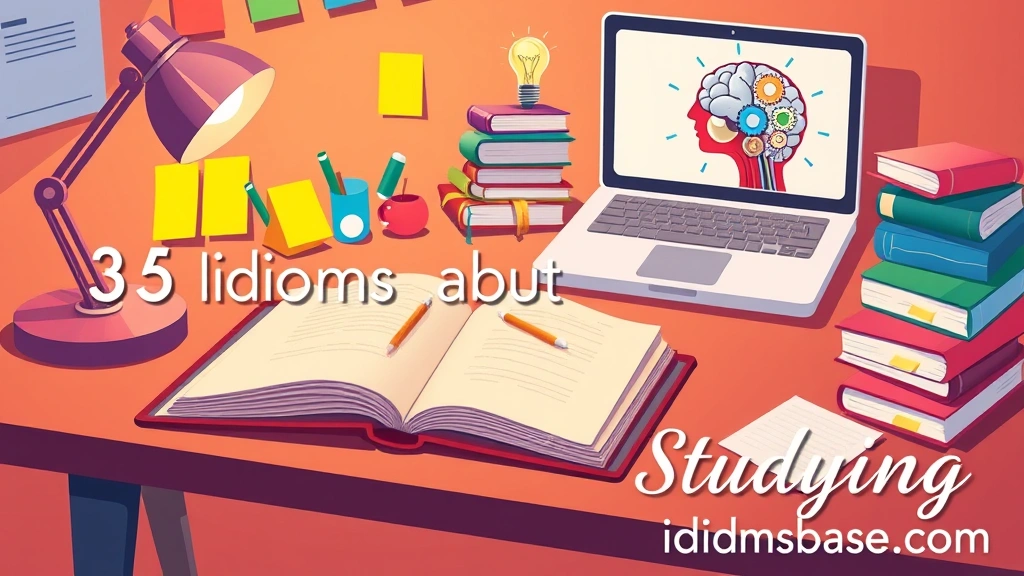Hey there, future knowledge-seeker! Have you ever felt like your brain is a sponge, soaking up every bit of information, or perhaps that you're burning the midnight oil just to ace that exam? Well, if those phrases sound familiar, you're already dipping your toes into the wonderful world of idioms! Idioms are like secret codes in language, phrases where the meaning isn't obvious from the individual words. They add color, flair, and a touch of wit to our conversations, especially when we're talking about something as universal as studying.
Think about it: how many times have you heard someone say, "I'm hitting the books tonight," and instantly knew they meant they were going to study? That's the magic of idioms! They make our language richer, more expressive, and honestly, a lot more fun. Whether you're a student, a lifelong learner, or just someone curious about the quirks of the English language, understanding these common idioms related to studying can really boost your communication skills. So, grab a comfy seat, maybe a cup of coffee (or tea!), and let's dive into 35 fantastic idioms that perfectly capture the ups and downs, the triumphs and struggles, of the studying journey. You're about to unlock a whole new level of linguistic mastery!
35 Brilliant Idioms About Studying You Need to Know
Ready to expand your vocabulary and sound like a true wordsmith? Let's explore these awesome idioms about studying! Each one tells a little story and paints a vivid picture of the learning experience.
-
Hit the books: This classic means to study hard.
- Example: "I can't go out tonight; I really need to hit the books for my history exam."
-
Burn the midnight oil: To work or study late into the night. It implies dedication and a bit of sacrifice!
- Example: "She was burning the midnight oil to finish her thesis before the deadline."
-
Cram for an exam: To study intensely in a short period, usually right before a test. It’s often a last-minute effort!
- Example: "I've been cramming for an exam all weekend, I hope it pays off!"
-
Learn by heart/Know by heart: To memorize something perfectly.
- Example: "You need to learn these formulas by heart if you want to pass the math test."
-
Pick up (a subject/skill): To learn something new, often without formal lessons.
- Example: "He picked up Spanish quite quickly after moving to Madrid."
-
Brush up on (something): To review and improve your knowledge or skill in something you haven't practiced for a while.
- Example: "I need to brush up on my French before my trip to Paris."
-
Get your head around (something): To understand something difficult or complex.
- Example: "It took me a while to get my head around quantum physics."
-
Sink in: For information or a realization to be fully understood or accepted.
- Example: "The professor explained it several times, but the concept didn't really sink in until I did the practice problems."
-
Go over (something): To review or check something carefully.
- Example: "Let's go over these notes one more time before the quiz."
-
Read up on (something): To read a lot about a particular subject to gain more information.
- Example: "I need to read up on the history of ancient Rome for my research paper."
-
Crack the books: Similar to "hit the books," meaning to open your books and start studying.
- Example: "Okay, time to crack the books and get serious about this project."
-
Pull an all-nighter: To stay awake all night studying or working.
- Example: "We had to pull an all-nighter to finish the group presentation."
-
Pass with flying colors: To pass an exam or test very easily and with a high score.
- Example: "She studied so hard that she passed the exam with flying colors."
-
Flunk out: To fail a course or school program, often resulting in expulsion.
- Example: "If he doesn't improve his grades, he might flunk out of college."
-
Sail through (an exam/course): To pass an exam or course very easily, without difficulty.
- Example: "She's so good at math; she'll probably sail through this calculus course."

-
Learn the ropes: To learn how to do a particular job or activity.
- Example: "It takes a few weeks to learn the ropes in a new job."
-
A quick study: Someone who learns new things quickly and easily.
- Example: "He's a quick study; he mastered the software in just a few days."
-
Brain drain: A situation in which many educated or talented people leave a country or area to live and work in another. (While not directly about personal studying, it relates to the outcome of education!)
- Example: "The country is experiencing a serious brain drain as its best scientists move abroad."
-
Food for thought: Something to think seriously about.
- Example: "The professor's lecture certainly gave us a lot of food for thought."
-
Go back to square one: To return to the beginning of a plan or process because it has failed.
- Example: "Our experiment failed, so we have to go back to square one."
-
On the right track: Doing something correctly or in a way that will lead to success.
- Example: "Keep studying like this, and you're definitely on the right track to getting an A."
-
Read between the lines: To understand the hidden meaning in something that is said or written.
- Example: "You have to read between the lines to understand the true intentions of the author."
-
Take notes: To write down important information from a lecture or text.
- Example: "It's important to take notes during a lecture to help you remember key points."
-
Tune out: To stop paying attention.
- Example: "The lecture was so boring that I started to tune out."
-
Work your way through (something): To gradually complete a task or understand a concept.
- Example: "I had to work my way through the entire textbook to understand the material."

-
Get the hang of (something): To learn how to do something, especially something that is not obvious or simple.
- Example: "It took me a while, but I think I'm finally starting to get the hang of coding."
-
A bookworm: Someone who loves to read and spends a lot of time reading.
- Example: "My sister is a real bookworm; she finishes a novel every other day."
-
Learn the hard way: To learn something through experience, usually an unpleasant one.
- Example: "I forgot to save my work and lost everything; I learned the hard way to save frequently."
-
Hit a wall: To reach a point where you can't make any more progress, often due to exhaustion or difficulty.
- Example: "After hours of studying, I finally hit a wall and couldn't absorb any more information."
-
Put your thinking cap on: To think very hard about a problem.
- Example: "Okay team, we need to put our thinking caps on to solve this complex equation."
-
Take a mental note: To make an effort to remember something important without writing it down.
- Example: "The professor mentioned that this topic would be on the exam, so I took a mental note."
-
Know something inside out: To know a subject or topic extremely well.
- Example: "He's been working on this project for years; he knows the system inside out."
-
Acing a test: To get a perfect or nearly perfect score on a test.
- Example: "I'm confident I'll be acing this test after all the studying I've done."
-
Crack the code: To figure out a difficult problem or understand something very complex.
- Example: "After hours of trying, I finally cracked the code to this challenging puzzle."
-
Go through the motions: To do something in a routine way without much enthusiasm or understanding.
- Example: "He wasn't really learning; he was just going through the motions of studying."

Your Study Buddy: A Quick Reference Table!
To make things even easier, here's a handy table summarizing some of our favorite idioms and what they mean. Bookmark this, print it out, or just keep it in your mental toolkit!
| Idiom | Meaning | Example Sentence |
|---|---|---|
| Hit the books | To study hard. | "I need to hit the books tonight." |
| Burn the midnight oil | To work or study late into the night. | "She was burning the midnight oil to finish her essay." |
| Cram for an exam | To study intensely in a short period before a test. | "I'm cramming for an exam all weekend." |
| Learn by heart | To memorize something perfectly. | "You should learn these poems by heart." |
| Brush up on | To review and improve your knowledge or skill. | "I need to brush up on my Spanish." |
| Get your head around | To understand something difficult. | "It took me a while to get my head around the new software." |
| Pass with flying colors | To pass an exam very easily and with a high score. | "She passed the test with flying colors." |
| Pull an all-nighter | To stay awake all night studying. | "We had to pull an all-nighter to complete the project." |
| A quick study | Someone who learns new things quickly. | "He's a quick study; he'll master this in no time." |
| Food for thought | Something to think seriously about. | "The documentary gave me a lot of food for thought." |
| Know something inside out | To know a subject extremely well. | "She knows the city inside out." |
Frequently Asked Questions (FAQs) About Idioms and Studying
You've got questions, and we've got answers! Let's clear up some common queries about using these fantastic idioms.
What exactly is an idiom?
An idiom is a phrase or expression where the meaning isn't obvious from the individual words. It's a figurative meaning that's understood by native speakers but can be tricky for language learners. For example, "kick the bucket" doesn't literally mean to kick a bucket; it means to die. Similarly, "hit the books" doesn't mean to physically strike a book!
Why are idioms important to learn, especially for language learners?
Idioms are crucial for several reasons! First, they are very common in everyday conversation, movies, books, and even academic texts. Understanding them helps you comprehend native speakers better and avoid misunderstandings. Second, using idioms makes your language sound more natural, fluent, and sophisticated. It shows you have a deeper grasp of the language and its cultural nuances. Plus, they're just fun to use!
How can I effectively learn and remember new idioms?
Great question! Here are some tips:
- Context is King: Always try to learn idioms in context (in a sentence, story, or conversation). This helps you understand their meaning and how to use them.
- Visualize Them: Create a mental image for each idiom. For "burn the midnight oil," imagine yourself with a lamp late at night.
- Use Them! The best way to learn is by doing. Try to incorporate new idioms into your conversations or writing. Start with just one or two at a time.
- Flashcards: Make flashcards with the idiom on one side and its meaning and an example sentence on the other.
- Group Them: Sometimes grouping idioms by theme (like "studying") helps.
- Review Regularly: Like any vocabulary, regular review helps cement them in your memory.
Are there any idioms that are specific to certain regions or countries?
Absolutely! While many idioms are widely understood across the English-speaking world, some are more common or even unique to specific regions (e.g., American English vs. British English) or even local dialects. For instance, while "hit the books" is global, some phrases might have more localized usage. Always pay attention to the context and who you're speaking with!
Can using too many idioms make my writing or speaking sound unnatural?
Yes, it can! While idioms add flair, overusing them can make your language sound forced, unnatural, or even confusing, especially if the idioms don't quite fit the context. The key is balance. Use idioms strategically to enhance your communication, not to overwhelm it. Think of them like spices in a dish – a little bit adds flavor, but too much can ruin it! Aim for natural integration rather than just stuffing them in.
Key Takeaways
Wow, we've covered a lot of ground, haven't we? From "hitting the books" to "passing with flying colors," these idioms truly capture the essence of the studying experience.
Here are the main takeaways from our exploration:
- Idioms are powerful linguistic tools: They add color, depth, and naturalness to your English, making you sound more fluent and articulate.
- Context is crucial for understanding: The meaning of an idiom often can't be guessed from its individual words, so learning them in context is key.
- Practice makes perfect: The best way to master idioms is to actively use them in your speaking and writing. Don't be afraid to try them out!
- They reflect cultural insights: Idioms often carry cultural nuances, offering a glimpse into the way English speakers think and express themselves.
- Studying is a universal experience: These 35 idioms show just how many ways we talk about the effort, challenges, and triumphs of learning.
So, next time you're "burning the midnight oil" or "cramming for an exam," remember these awesome idioms. Not only will they help you express yourself more vividly, but they'll also make your English sound truly authentic. Keep learning, keep exploring, and keep those linguistic gears turning! You're doing great, and with a little effort, you'll be "sailing through" your language learning journey!






